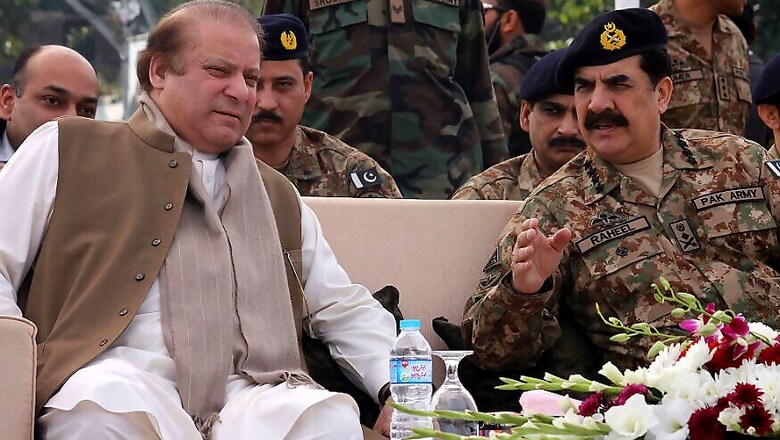
views
New Delhi: When the prime minister of a country meets the chief of army to discuss a newspaper article, you know the stakes are high. Just how high is the question you would ask if you are a Pakistan watcher.
Pakistani and Indian analysts that News18 spoke to are of the view that it is highly unlikely that such a confrontation occurred, yet the report seems to have been serious enough for the PM to order “stern action”.
Dawn’s original story pieces together details of an “undisclosed” meeting that took place between the civilian and military leadership on the side-lines of an all-party conference called last week. While the analysts feel that a meeting may indeed have happened, it was probably not as confrontational as the Dawn report has made it out to be, because of the nature of civilian-military relations in Pakistan.FULL COVERAGE: Indian Army's Cross-LoC Surgical Strikes
“Some conversation of this nature would have happened, but not a confrontation,” Ayesha Siddiqa, an Islamabad-based geo-strategist and political commentator, who has studied the Pakistani military, told News18 in a phone conversation from Dubai. “In the report, it seems as though Nawaz Sharif angrily told them (military) we are getting isolated, I don’t think that happened. The military is still completely in control,” she said.
Pakistani nuclear physicist and activist Parvez Hoodbhoy, in an email interview said there must be some truth to the Dawn report because such tensions between the two are definitely being felt. However, maybe the conversations were not exactly as reported, he said.
Dawn reported that the government delivered a blunt message to the military leadership about Pakistan’s growing international isolation and sought consensus on actions by the state in a meeting. Punjab Chief Minister Shahbaz Sharif had a verbal confrontation with the intelligence chief Gen Rizwan Akhtar during the same meeting, an exchange that the newspaper termed “ground shifting”.
Mohan Guruswamy, chairman of the New Delhi-based think tank Centre for Policy Alternatives, agreed with Siddiqa that the notion that Shahbaz Sharif, who is also Prime Minister Nawaz Sharif’s brother, could have had a bare knuckles confrontation with General Rizwan Akhtar, the head of the Inter-Services Intelligence, is incorrect.
“That’s a joke. I can only laugh about it. I don’t think Mr Shahbaz Sharif could so angrily confront the director-general of the ISI. He’s somebody who’s closer to the military of the two Sharifs. I don’t think he has it in him to confront,” Siddiqa said. Guruswamy said he had “doubts that Shahbaz Sharif could have had a confrontation”.
Siddiqa and Hoodbhoy said the report could be a leak by the establishment, though both differed on the purpose of the leak. Siddiqa believes that the leak was by the military and Hoodbhoy thinks the government may be responsible.
“I think it’s a leak by the military (because) everybody benefits by the story: the government comes out looking strong, the military comes out looking neutral and Dawn comes out looking very good for having done a critical exclusive,” Siddiqa said.
“This could have been a discreet and deniable leak intended to explain to Pakistanis that it is actually the army, not the government, which is responsible for this bad state of affairs,” Hoodbhoy said, adding that, “India's failure in Kashmir and human rights violations are not being translated into success for Pakistan. Nawaz Sharif's government is being blamed for this lack of success.”
Indian strategic analyst Mohan Guruswamy feels what actually happened between the government and the military was a “consultation” rather than a confrontation and the resulting leak was a “spin” by the political leadership. “I think this is a spin by the political leadership to get a good cop, bad cop scenario going to confuse us, so that we will keep talking to the civilian leadership,” Guruswamy, the Chairman of the Centre for Policy Alternatives said.















Comments
0 comment